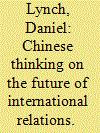| Srl | Item |
| 1 |
ID:
142388


|
|
|
|
|
| Summary/Abstract |
Chinese nuclear experts began to join international nuclear dialogues in the late 1970s when China launched its policy of reform and openness. Their communications with U.S. nuclear experts are sometimes difficult and inefficient, in part because of differences in the ways that Americans and Chinese think about nuclear weapons.
|
|
|
|
|
|
|
|
|
|
|
|
|
|
|
|
| 2 |
ID:
089393


|
|
|
|
|
| Publication |
2009.
|
| Summary/Abstract |
China's evidently unstoppable "rise" energizes PRC political and intellectual elites to think seriously about the future of international relations. How will (and should) China's international roles change in the forthcoming decades? How should its leaders put the country's rapidly-increasing power to use? Foreign China specialists have tended to use an overly-streamlined "resisting" the West versus "co-operating" with it (or even simpler "optimistic" versus "pessimistic") scale to address such questions, partly reflecting the divide between Realism and Neoliberalism in American international relations theory. By 2002, a near-consensus had developed (though never shared universally) that China had become an increasingly co-operative power since the mid-1990s and would continue to pursue the policy prescriptions of Neoliberal international relations theory. But using more nuanced "English school" analytical techniques - and examining the writings of Chinese elites themselves, aimed solely at Chinese audiences - this article discovers an unmistakably cynical Realism to be still at the core of Chinese thinking on the international future. Even elites who appear sincere in their promotion of co-operation firmly reject "solidarism" among the world's leading states and insist upon upholding the difference between China and all others. Many demand - and foresee - China using its future power to pursue world objectives that would depart in significant respects from those of the other leading states and non-state actors.
|
|
|
|
|
|
|
|
|
|
|
|
|
|
|
|
| 3 |
ID:
155580


|
|
|
|
|
| Summary/Abstract |
FENG ZHANG finds that the ongoing debates among diverse Chinese actors and interest groups, suggest that China has not developed a distinct or coherent strategy toward the South China Sea. He argues that the future of Chinese policy remains dependent upon the outcome of this debate and the interactions between China and other countries involved in the region.
|
|
|
|
|
|
|
|
|
|
|
|
|
|
|
|
| 4 |
ID:
098096


|
|
|
|
|
| Publication |
2010.
|
| Summary/Abstract |
A review of four periods and a comparison of three regional institutions provide evidence for how serious China has become about multilateralism with its neighbors in Asia. Approval for multilateralism does not mean that China is ready to endorse strong regional organizations that bind their members, especially when it has reservations both about institutions that could undermine its narrow notion of sovereignty and norms that could support US or even Japanese efforts to impose long-feared universal values. If China calculates that limited multilateralism now provides a variety of benefits, to date its support reflects specific circumstances, not general trust in this format. Focusing on the Six-Party Talks as the presumed foundation for regionalism in Northeast Asia offers a concentrated view of strategic thinking toward the area most vital to China's security. In the standoff between North Korea and the United States we are able to assess the degree to which China accepts working with four or five states and the prospects for its active support, if circumstances permit, for the establishment of a peace and security mechanism through the fifth working group that originated in the Joint Agreement of February 2007.
|
|
|
|
|
|
|
|
|
|
|
|
|
|
|
|